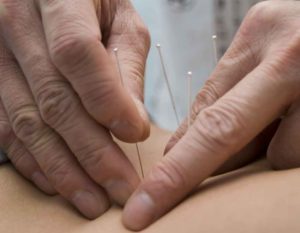Acupuncture can help reduce the risk for coronary heart disease (CHD) in patients with fibromyalgia, a new study suggests (Arthritis Res Ther 2017;19:37).
Researchers from China Medical University, in Taiwan, evaluated data from the Taiwanese National Health Insurance Research Database to assess whether acupuncture decreases the risk for CHD in fibromyalgia patients. The investigators initially identified 189,512 patients with a new fibromyalgia diagnosis between Jan. 1, 2000, and Dec. 31, 2010.

These patients were then separated into an acupuncture cohort (n=81,843; patients who received acupuncture from their initial diagnosis of fibromyalgia to Dec. 31, 2010) and a no-acupuncture cohort (n=76,582; patients who never received acupuncture during the study period). The final analysis included 58,899 patients from each cohort after researchers performed 1:1 propensity score matching.
They found that overall incidence of CHD was significantly lower in the acupuncture group (adjusted hazard ratio, 0.43; 95% CI, 0.41-0.45).
“The beneficial effect of acupuncture on the incidence of CHD was observed in both female and male patients,” the study authors wrote. They noted that the risk for CHD gradually increased with age, and acupuncture significantly decreased the incidence of CHD in all age groups and “decreased the risk of CHD in patients with fibromyalgia with or without comorbidities.”
Researchers reported that 4,389 patients in the acupuncture cohort (17.44 per 1,000 person-years) developed CHD during the follow-up period compared with 8,133 patients in the no-acupuncture cohort (38.36 per 1,000 person-years).
“Regardless of whether patients took oral steroids, NSAIDs [nonsteroidal anti-inflammatory drugs], or statins, fewer patients in the acupuncture cohort developed CHD than in the no-acupuncture cohort,” they wrote.
The investigators speculated that acupuncture decreases CHD in fibromyalgia due to the inhibition of N-methyl-D-aspartate receptor, 5-HT3 receptor, or the mechanisms of acupuncture including antidepression, anti-inflammation and improvement of sleep quality.
The investigators noted that study limitations include a lack of specific patient information such as fibromyalgia severity and lifestyle. They said more clinical and mechanistic studies are needed.
